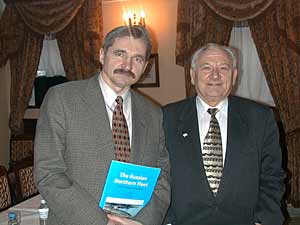
Court decision puts Norway on the hook for massive CO₂ Storage build-out
A ruling by the European Free Trade Association Court that Norway’s continental shelf falls under the European Economic Area Agreement could dramatic...
News

Publish date: December 3, 1999
Written by: Runar Forseth
News
Prosecutor calls experts to Court:
According to the Russian Criminal Procedure Code the prosecutor may demand that members of the expert committees involved with the case be heard during the trial. Prosecutor in the Nikitin case, A. Gutsan, used this option today, delaying the closing of the case with at least 14 days, by calling experts from Moscow. The experts will appear in Court between 14 and 16 December.
The scheduled continuation of the trial is this: Proceedings continue on 6, 7 and 9 December, with further examination of the Court documents. Then, on 14 through 16 December, experts from Moscow will have their say. Closing speeches will be made during the week starting 20 December, probably concluding on 22 December.
Then Judge Golets will need some time to prepare the verdict, which will hopefully be presented before the year’s end.
Admiral Mormul supported Nikitin
Today, Rear Admiral Nikolay Mormul, retired, testified in Court. Mormul has been known to support Nikitin’s work, and he did so today. He was also present at the following press briefing.
“Mormul showed admirable clearness today,” said chief defender Yury Schmidt. “The Admiral was confident that Aleksandr Nikitin’s work had been to the benefit of his country, and not the opposite. He told the Court that all accidents should have been handled openly, with the press getting the information only after the relatives in case of deaths.”
Gutsan – for the occasion Schmidt jokingly called him ‘our favourite prosecutor’ – had then asked how he thought such things were handled in the west. The Admiral had answered, “It’s because the U.S. Navy was all openness around their two serious nuclear submarine accidents that they had no serious accidents later. They were able to learn from their errors.”
The prosecutor had only asked four or five questions of the witness.
“The Bellona report should be in all submarines”
“The description of the accidents and catastrophes that has happened in our navy, should be a lesson for the whole world for the future,” Mormul had stated in Court, continuing, “The Bellona report should be present on the bridge of all nuclear submarines. The dead should teach the living how to avoid a similar destiny. If we make a secret out of this information, then there will be real danger.”
“The judge listened carefully to my testimony,” said Mormul. “He seemed to be seeking the truth.”
“Mormul considered Bellona’s work as very valuable and thereby created a good contrast to the testimony of Perovsky yesterday,” Schmidt added.
Defence to analyse the proceedings so far
“We will prepare an analysis about how the case has developed,” said Aleksandr Nikitin. “Perovsky gave us a good point in his testimony yesterday, where it became clear that the case started with falsified documents. I can not say more at this point.”
Schmidt would not comment further on the Perovsky testimonial yesterday. “Not before my closing speech, or possibly through a press relase.”
The prosecutor did not present any documents on the Perovsky case today, in spite of Golets’ request yesterday.
No further press briefings were scheduled at this point. Information on this will be published on this web site.

A ruling by the European Free Trade Association Court that Norway’s continental shelf falls under the European Economic Area Agreement could dramatic...

Bellona held a seminar on countering Russian disinformation in the Arctic at the Arctic Frontiers international conference in Norway

Our December Nuclear Digest, reported by Bellona’s Environmental Transparency Center, is out now. Here’s a quick taste of three nuclear issues arisin...

Bellona has launched the Oslofjord Kelp Park, a pilot kelp cultivation facility outside Slemmestad, about 30 kilometers southwest of Oslo, aimed at r...